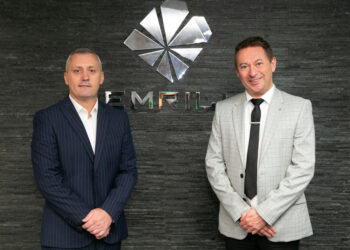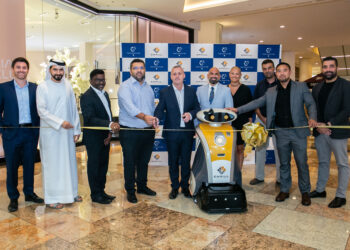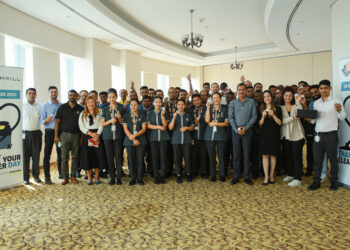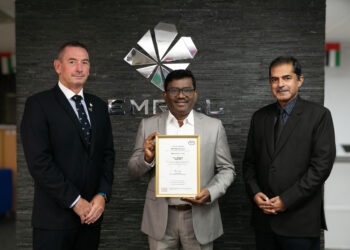
Innovation has been a hot topic in the UAE. In January, HH Sheikh Mohammed Bin Rashed Al Maktoum, Vice President, Prime Minister and Ruler of Dubai, announced 2020 would be the year in which the emirates prepares for the next 50 years. The 50 Year Challenge officially launched under the patronage of His Highness Sheikh Mohammed Bin Rashed Al Maktoum with the inaugural UAE Innovation Month, which took place during February, dedicated to designing the future and enriching the quality of life for the UAE’s residents.
Emrill has embraced the opportunity to sustain and grow its market share and service offering through continuous improvement and innovation, but it’s not all robots and AI.
Stuart Harrison, Emrill’s CEO, explains: “We hear an awful lot about all the technology we could and should be using in the FM industry. While it’s all good stuff, FM providers need to stop and ask themselves a critical question. Do their clients want to invest in innovation? There is definitely a case for the long-term potential of technology saving significant time and money, but inevitably, many of these big savings come with a high, upfront cost.
“Emrill has approached innovation a little differently. First, we asked ourselves critically and honestly, just because a technology exists, should we be using it? In a lot of cases, the answer was no. However, doing things the way they have always been done wasn’t an option either. In order to grow and be competitive, Emrill needs to constantly challenge the status quo to give clients the best value and the best services when they need them. Based on that, we involved every Emrill employee and challenged them to think outside the box. We posed a simple question – what can we do differently to be better?”
To bring its employees together and encourage them to share ideas, Emrill holds continuous improvement workshops throughout the year. At these workshops, people at all levels of the business are given the opportunity to discuss challenges they are facing within the communities and facilities they work and make suggestions on what changes could be implemented to increase efficiencies and decrease costs, while providing the same level of service Emrill’s customers have come to expect.
Gopalakrishnan, operations director at Emrill, provided more information: “As a result of these workshops, Emrill has created a company-wide culture of innovation. Every employee is accountable for assessing how we deliver services and how we can do things better. We’ve had some great ideas from the team, and we have moved forward with over thirty suggestions. That includes new equipment and updated methodologies.
“We wanted to innovate with the customer in mind. How can we provide better services? How can we do things more efficiently? How can we save our clients money? These are the questions we kept asking ourselves and drove our ideas.”
Many of the innovations Emrill has launched over the last twelve months have resulted in increased efficiency and time saved. For example, its efficiency-enhancing app enabled a system-driven approach for housekeeping activities, increasing productivity and proactivity. Using their smart devices, housekeeping staff can follow a set route and tasks are automatically triggered when they are in the vicinity of required work. Following the app’s launch, Emrill has been able to reallocate a significant portion of its manpower to other sites while still completing the same number of tasks as before in a shorter period of time with zero complaints.
Emrill has also introduced other technology, including the UAE’s first CMAR NC 286R hot water pavement cleaner with suction. Through a combination of high-pressure and heat, the CMAR cleaner doesn’t require any additional chemicals to achieve impressive results. Also, because the CMAR cleans in a single run, the need for rinsing has been eliminated, resulting in a 30% reduction in water used. In addition to being more environmentally friendly than other cleaners, the CMAR NC 286R offers cost-savings to the operator and the client. A trained two-man crew operates the cleaner and can achieve the same results as a 13-man crew manually cleaning the same area.
Robotic swimming pool scrubbers and solar-powered skimmers have also been implemented in the communities Emrill maintains. The robotic swimming pool scrubber is fully automated, completing cleaning work that has traditionally been carried out manually. This has increased productivity, as cleaning staff can carry out other work while the scrubber works unattended. The solar-powered surface skimmer requires no human intervention and cleans the surfaces of water throughout the day.
To enhance lake management within communities, Emrill developed and fabricated a skimmer attached to a pedal-operated boat and also brought onboard a custom-developed, high-volume-low-speed algae removal pump. The team also modified the existing lake fountains to improve aeration, which has had a positive impact on aquatic life within the lakes. In 2019, as a result of Emrill’s innovations, the FM provider has achieved a 25% eduction in algae waste, which has reduced truck trips and total waste generated.
Other innovations Emrill has implemented, resulting in significant time savings and efficiencies, include a modified club car fitted with high-pressure, directional washers, an automatic door-close mechanism in communal areas, sensors to track the level of garbage in waste receptacles and smart apps to track utility consumption and work checklists, as well as remotely monitor the functionality of assets.
Gopalakrishnan said: “As a result of the efficiencies we have achieved, we have been able to either pass on cost savings to clients or, in some cases, offer an expanded scope of services without having to raise prices. In these cases, our innovations have allowed us to support our clients through dips in the market without compromising on quality.”
Further adding to cost savings on-site, Emrill installed bird spikes and utilised bird-free gel. By preventing birds from settling and nesting on structures, the cleaning teams do not have to allocate as much time to cleaning away bird droppings. Significant savings have also been made through the development and fabrication of a tripod that enables cleaning personnel to remove manhole covers and position borewell pumps. This has reduced the need to hire a 25-tonne crane to carry out the works, as well as saving 30 working hours that were required to barricade and manage traffic while using the crane.
Emrill has also replaced GI pipes with UPVC pipes in borewells, increasing the durability of the pipes and reducing the risk of legionella growth as a result of rust. The team has also made savings by modifying existing light fittings, allowing them to use more energy-efficient bulbs without having to replace the entire fixture.
Sustainability has and continues to be a core pillar for Emrill, and nowhere is this more evident than in the company’s efforts to reuse, recycle and repurpose equipment that would otherwise be thrown away. For example, using parts from bicycles, Emrill has fabricated a ride-on mounted sweeper. An upright weeding tool has also been developed from bicycle parts. This tool is easy to use and eliminates the need for the operator to repeatedly crouch and bend to remove weeds from pavements.
Emrill has reduced water and energy consumption. Through modification of swimming pool circulation system control mechanisms, the circulation pump stops when the HCU stops, reducing energy consumption and increasing the life of the equipment. To further reduce water consumption, Emrill reuses swimming pool backwash for all pressure washing activities.
“Innovation isn’t limited to saving time or money,” Gopalakrishnan explains. “Emrill is also dedicated to improving the health and safety of its workforce through the use of tools, upgraded methodologies and equipment. For example, we know that working at height has the potential to be incredibly dangerous for employees. To mitigate these risks, we have implemented the use of safe ladders on-site.”
Emrill has also developed and fabricated tools for the cleaning of canopies, coves and light poles. Telescopic pole pressure washers and modified cleaning tools are safe to use in crowded areas and do not require a man lift. Not only has this reduced the requirement to work at height, but it has also eliminated the requirement for man lift operators and flagmen, allowing resource optimisation on-site.
Harrison concluded: “Emrill has and always will put people first. Everything we do has a purpose rooted in improving the services we offer and ensuring client satisfaction. That starts with making sure Emrill’s people are safe and well looked after. There is nothing so urgent or important that we cannot do it safely, and we are committed to making sure our people have the right tools and equipment.
“There may be some people who say what we have developed and implemented isn’t that innovative at all. To that, I would tell those people to look at the results we have achieved. Every change we make, every new piece of equipment, every time we upgrade or modify one of our methodologies, we do so knowing it will have a positive impact on how efficiently we execute contracts for our clients. We can see tangible results, and we have measured the cost and time savings. We think that’s the very definition of innovation, and we’re excited to see what new creations the team suggests and implements in 2020.
You may also like
-
Thank Your Cleaner Day
November 8, 2023




